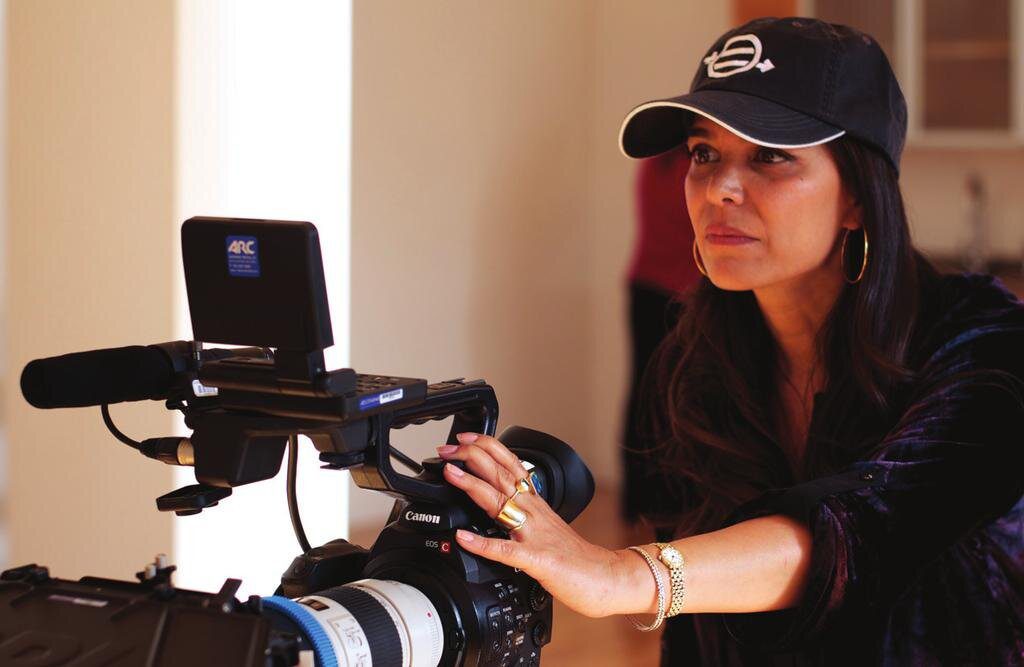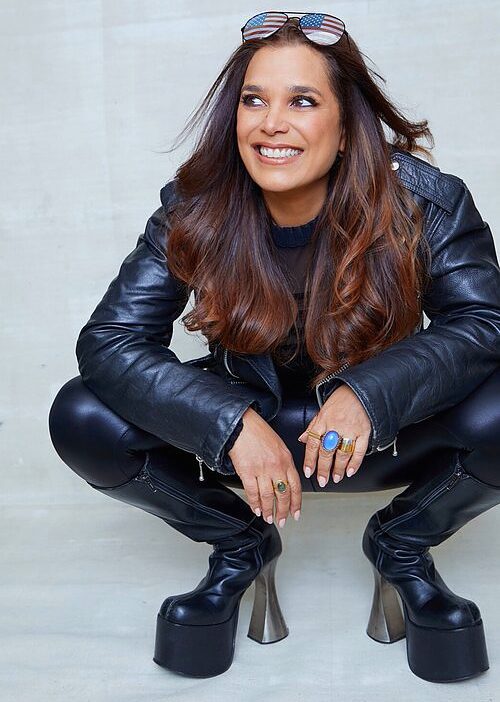Kamala Lopez has worked as an actor in over 30 feature films, including Born in East L.A, Deep Cover, The Burning Season, Clear and Present Danger, Lightning Jack, and I Heart Huckabees; and has starred in over 60 television shows including Black Jesus, Medium, 24, Alias, NYPD Blue, Beverly Hills 90210, Hill Street Blues, Miami Vice, and 21 Jump Street (winner of the Imagen Award). She also hosted the PBS series Wired Science.
Besides her work in film and TV, Lopez, a Yale University graduate in Philosophy and Theatre Studies, formed the production company Heroica Films in 1995 with the mission to write, direct and produce media for women, about women and using women both in front and behind the camera.
Los Angeles County’s Board of Supervisors and the Women’s Commission, who named her 2015 Woman of the Year (Arts/Media), has recognized her work on behalf of women and girls. In 2016, the State of California awarded her the Latino Spirit Award for Achievement in Advocacy and Entertainment and the national civil rights group Equal Rights Advocates named her Champion of Justice.
In this interview Lopez discusses her work in front of and behind the camera, championing women’s rights in entertainment and her role as the Founder/ED of her organization Equal Means Equal, which was made into a feature film and offers an unflinching look at how women are treated in the United States today.
Jason: Can you begin by telling us the story of how you grew up?
Kamala Lopez: I was born in New York City, to a mother from South India, and a father who was a New Yorker, but he was a first-generation Venezuelan immigrant. His father had to escape from the dictatorship in Venezuela. My family, on my father’s side, were all journalists. And they were very political. They ended up getting in a lot of trouble with the dictatorship in Venezuela, and they had to make an escape to the United States with help from the British and French governments. I forced my parents to move back to the United States when I was 14 because I just couldn’t tolerate seeing the poverty, the inequality in Venezuela, the lack of social mobility, autocracy, the sort of reinforcement of a caste system based on socio-economic class. And because I was an American person, I present as a person of color. Foremost, it was fascinating to me because I was discriminated against in Venezuela, by both the Americans, Brits and Dutch, who were the people that I went to school with, who were there for the oil, living in Minnesota for the oil and the Venezuelans themselves that identified me as a gringo. So I’ve always been outside whatever it was where I was supposed to belong. And I think that’s had a big effect on how I carry out my life.
Jason: Can you share a story about what brought you to your specific career path?
Kamala Lopez: I have always been an actress, ever since I was seven years old when I started in Venezuela. And my father was in the commercial art business, so it was not unfamiliar to me, the professional work of the actor. By the time we moved to the United States, I got my first agent when I was 14. And my first gig on television was Sesame Street, where I played Maria’s cousin. I credit the people at Children’s Television Workshop for such a beautiful introduction and such a positive, supportive environment for a child to be working in. I skipped a couple of grades early in my education, moving from the British system to the American system. And so they admitted me to Yale when I was 16. I had booked a film opposite Robert De Niro. And my mother was adamant that I would not do the film, that there would be time to do films for the rest of my life and that I would focus only on my education for the four years that I was in college. Then I moved back to New York and did a bunch of television that was there—Miami Vice, Hunter, The Equalizer—whatever was going on there. So I moved to Los Angeles, and within a couple of weeks, I booked It’s Garry Shandling’s Show, which was turned out to be one of the greatest comedy series that we’ve had, it spawned a lot of present-day comedy if anybody reading this hasn’t seen the Garry Shandling Show, or the following show he did, The Larry Sanders Show, I recommend them. Yeah. So that’s the story of the acting, and it’s just sort of persevered.
Jason: What projects attract you as an actress and as a filmmaker?
Kamala Lopez: I think I look for different things. As an actor, I’m really looking for a playing a full three-dimensional human being that has good and bad things about them. The more complex, the better. When it comes to projects that I’m going to invest years of my life in putting out into the world, I hold myself to an extremely high standard because I believe that it’s not just show business. I take umbrage at that term. I believe that it is show art; it is show future; it is show humanity; it is showing people what we want the world to be. For me, making art and making media are sacred responsibilities. And I know people say you want to send a message, call up Western Union. But that’s disingenuous because art is messaging, it’s messaging on a profound level. It has effects that we cannot even quantify. And so it is incredibly important for us to be responsible for what we put out.
Jason: Utilizing your voice for advocacy and change is so obviously extremely essential to you. What’s the response to those who say it’s critical to me, too? I think artists should speak up. What’s your response to those who say performers should just stay away from social issues?

Kamala Lopez: Well, I do think that I think that all people are entitled to their opinion. I think the issue is that because actors have a higher platform, and higher visibility, then their opinion automatically takes on greater weight. I don’t think the idea of silencing individuals is the right one. But I do think that actors should be informed, they should be educated, they should not be blathering ridiculously about things they don’t know. Because it makes us all look idiotic. And I do think I think all people should be involved in social issues. I don’t think we should close down others that have a different point of view. It’s a time for evolution. It’s a time to elevate the qualities that we bring to the table that have been denigrated so far. Qualities like compassion, empathy, collaboration, the ability to see a problem holistically, the ability to look at all angles before making a decision, patience, love, nurturing, all of these things are in very short supply in the world we live in now.
Jason: What do you feel it’s important to have diversity represented in film and TV? And how does that affect our culture?
Kamala Lopez: So for me growing up, I never saw anybody in film or television that looked like me, spoke like me, or had anything to do with me. And when I started working, that continued, the roles that I went up for were maids, drug addicts, crack addicts, prostitutes, street prostitutes, pregnant teens, and gang-affiliated people, that was sort of the entire panorama of the options available to me. And they were so distinct. It was like researching how to be a street crack whore for me, which I did on Deep Cover, was, you know, as challenging a research job as it would be to play Queen Elizabeth. I mean, the people in power at the time did not know who I was or anybody that looked like me or what our experiences were, and none of us were in the writers’ room, none of us were producing, none of us were casting, none of us were doing anything. And so that was reflected. While I stepped out of the business, it’s undergone a radical shift. And it’s right now experiencing a bit of a backlash right now. Power in Hollywood is strong. I did This Is Us and Hacks, both of which had female directors. The first director was Asian. The second director was the creator. So many people of color were all over the place, which I never saw before except in very specific areas of the crew. Hollywood has made great strides.
Jason: What upcoming projects are you working on that you are most proud of?
Kamala Lopez: I’m excited to be in the new season of (the hit HBO series) Hacks which won every Emmy under the sun, so the fact that I stepped back into the game and got hired by two of the top shows, Hacks and This Is Us is certainly positive. I’ve also written a new 30-minute comedy pilot I am setting out to star in, and I’m working on finding a partner for that. It takes place in the world of feminist politics and Hollywood, and it’s in the vein of Veep meets The Larry Sanders Show. It’s very satirical, very dark, but funny as all hell. All that I’ve experienced in this political feminist movement is just astonishing and hilarious. I might come to Canada and approach the CBC with it because this project might just be a bit more than America can bear (laughs).

Jason: What advice do you have for someone who might want to embark on this career?
Kamala Lopez: If you’re a young person who wants to get started in an acting profession, whether it is in the theatre or film and television, the most important thing I believe you can do aside from training which is critical, I’ve always trained and never stopped training. I’m always in class. You never stop learning or growing. Aside from that, the other thing I would say is to learn about yourself. In this profession, you’re going to face questions you haven’t asked yourself before, and it helps if you ask yourself them in advance so that you’re not put on the spot, and you don’t decide you’ll later regret and this is true for females, although it is becoming more and more so with males if you’re comfortable with nudity than wonderful, if you’re uncomfortable with nudity you need to be very certain and strong about that and communicate that to your agent, talk to them about whether you’re comfortable using a body double and if you want approval that person. I don’t do nudity, however, they have asked me to multiple times, although I’ve been clear that I don’t. When you’re on a set with hundreds of people and your job is on the line and the director is telling you to be a team player and just do it, you want to be secure in your position and have those positions in order. Make your own plans in advance for when those situations arise. Don’t get frightened and don’t be forced into silence because that will hurt others as this behaviour continues to go on. There is no job, agent or director that is worth more than your integrity, your autonomy or yourself.
Jason: How can readers follow you online?
Kamala Lopez: My website is www.kamalalopez.com which is more about my acting work. My Instagram is www.instagram.com/actress_kamala_lopez and my organization’s website is https://equalmeansequal.com
Jason: Thank you for talking to us.
Kamala Lopez: Thank you for taking the time to speak with me.

